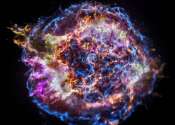Machine learning paves the way for smarter particle accelerators
Scientists have developed a new machine-learning platform that makes the algorithms that control particle beams and lasers smarter than ever before. Their work could help lead to the development of new and improved particle ...









